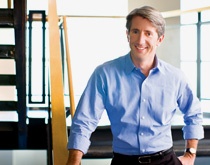Last summer, I experienced Facebook overload. I was at the grocery store with my daughter when I received a call from a relative who knew exactly where I was and what I was doing when I answered the phone. I was picking up picnic ingredients—nothing terribly interesting—so it was surprising to discover that someone unexpected knew this information. When I asked my caller how she knew all of this, she said that she had read it on my daughter's Facebook page. A pre-teen daughter, a laptop, and a leading social networking tool—that's all that was needed to remove any last shred of privacy I might have had on that summer morning.

My daughter and her aunt had just engaged in a complex act of communication involving a remote server, applications accessed by Web and mobile phone, and data transmitted by wireless routers. Neither of them had training to learn how to do any of this. Nonetheless, the human desire to communicate was satisfied by powerful, well-designed computer technology. Despite my annoyance, I still noticed the sharp contrast between this typical experience with social media and what we confront when we face the technology of industry. Consider, for example, my visit last summer to the doctor's office.
After the doctor entered the exam room where I was freezing and alone for so long that I thought I'd been forgotten, he sat in a chair opposite mine and placed an open laptop on a stool between us. Then something strange happened. Looking intently at his computer screen, he began to ask a series of sensitive questions. Why was I there? How was I feeling generally? What was the cause of my mother's early death? Were my daughters in good health? He barely looked up from his typing. I couldn't help but wonder, would he hear any hesitation in my voice? Would he recognize fear in my eyes? Would he ever be done with that damn computer!? I work in the technology industry and can appreciate his commitment to recording information accurately. But as a patient, I was bothered by this laptop and how it distracted him from really hearing my answers. How would a technophobe feel about this situation? And how might it affect the quality of care?
What makes Facebook, Twitter, and similar products successful is their design. They are easy to use and elegant in their simplicity. These design considerations were evidently absent from the technology product my doctor was using.
When I was a design student in a studio atop the winding staircase in Baker Hall, I learned that the best designs came from equal measures of what I knew about design and what I understood about the people for whom I was designing. For the past 20 years, I have been sending designers into all sorts of complicated places—prisons, private homes, government offices, manufacturing plants, executive suites, hospitals, banks, brokerage houses, and even baseball parks. There, these designers learn to understand both the people and the contexts for which they are designing. In my world, engineering begins with understanding people—their needs, expectations, and goals in a variety of circumstances.
Designers and design thinking are immensely powerful. They can turn elaborate acts of communication into child's play. And these days, that's serious business.
—Harold Hambrose (A'89)



